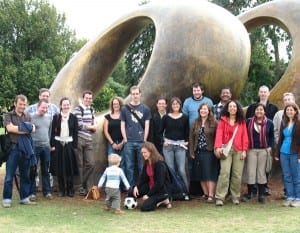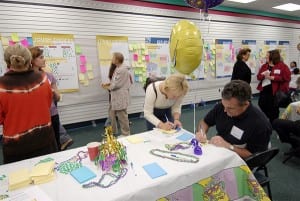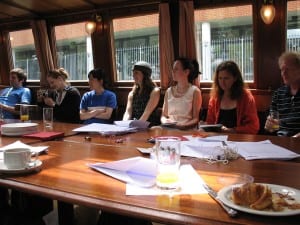Away daze – or how to make workshop training work for you
By Rachael Sparks, on 12 November 2013

UCL Museums and Collections staff enjoying an Away Day at Kew Gardens. No post-it notes were harmed in the making of this photograph.
Last week, I attended a Collections Trust training event aimed at developing my managerial skills. It was a slick, well-run affair, which I enjoyed despite being in the throes of a terrible cold.
Now I’m a bit of a training junkie, and go to a lot of these sorts of things. Past highlights of my training calendar include courses on dealing with contentious subjects, museum mount-making, digital photography, and record and archive management, not to mention away days visiting countless museums I’d never previously heard of.
Something of a gestalt has developed out of all this, and I think I’m beginning to see a pattern emerging in the culture that is the museum workshop event. So here’s my take on the five key ways in which training works for the museum sector, and makes us better and happier employees.
1. Training increases staff satisfaction
Workshops generate well-being. While I’m not even sure that was a word a few years ago, well-being is now all the rage, and attending a training workshop contributes to this in a number of ways.
Key to this is being issued with a name tag when you first arrive. This tells you that you have not only arrived, but arrived in The Right Place. It marks you as an Important Person. Coming as most of us do from lower down in the echelons of the museum hierarchy, this can be quite a heady experience.
It also creates a warm, fuzzy feeling of belonging. Name tags give us an identity; they brand us as part of the training group (us) as opposed to the people who are doing the catering (them), or wandered in by mistake (the other).
This feeling of satisfaction will last for a good five minutes, until you start reading other people’s name tags and museum-envy starts to creep in.
Admittedly, name tags also create the first moment of workshop tension, as you have to decide where to pin your badge. Do you want people’s eyes to be drawn down to your chest? Do you clip it to your jacket, knowing full well that you’ll end up slinging it over the back of a chair and forgetting about it? Or does it hang from the pocket of your jeans, where nobody will see it?
Then for the rest of the day, you, like everyone else, will be desperately trying to locate the name on other people’s badges, so you can figure out who you’ve just spent the last 10 minutes talking to.
2. Training improves acronym-generating skills
When I first began working with UCL Museums and Collections, I faced a number of institutional barriers, not the least being the one of language. Use of acronyms was de rigueur, and of course there were no training sessions or manuals provided to help you learn how to use them. It was all a bit WTHATTAN (or ‘what they hell are they talking about now?’)
Eventually, through a close study of context of use, I figured out what was going on, and came to the conclusion that the reason nobody ever stopped to explain their acronyms was because nobody could remember what any of them actually stood for.
A really good workshop will present you with a string of new, unfamiliar acronyms with which to pepper the next collections committee meetings you attend. Finally, pay-back time against your stay-at-work colleagues.
3. Training keeps the post-it note industry in business
No training day would be complete without at least one exercise in which groups do some desultory brainstorming, write lots of ideas on colourful post-it notes with fuzzy felt-tip pens, then stick them up triumphantly around the room.
In these groups, there is always something of a pattern. There will be the people who talk too much, the people who won’t talk at all, and those who have an interesting story to tell about their own museum even though it isn’t strictly relevant.
Brainstorming always ends with an embarrassed silence, when we all realise that someone is expected to give feedback to the rest of the room. What sounds fabulous in the context of a small discussion group then gets reduced to five second sound bites, which immediately seem somehow banal and obvious. At which point you begin wondering how long it will be to lunch. Bringing me to:
4. Training makes you have lunch out of the office
My own experience is that most of us work too hard, and don’t take enough time out for normal things like eating lunch. Perhaps this is why traditional workshop catering has become such a thing of beauty.
For a start, there’s a massively complicated choice of teas to have, which you contemplate for a good 2 minutes before choosing whatever it is you normally have anyway. Followed by quality biscuits, with bits in.
Then for lunch, there will be fancy sandwiches and wraps of the type you never normally see. You’re not really sure what’s in them, and it does take away some of the charm by having to eat it off a paper plate while balancing a drink and a wad of paperwork in your other hand, but still, anything new is exciting.
And finally, if it’s a really good workshop, there will be cake, which you eat and regret almost immediately. Before taking another slice. What’s not to like?
5. Training forces you to talk to other people
Training days and workshops are all about networking. The aim is to organise an event, fill the room full of people who could benefit enormously by talking to each other about what they do, and sit back and watch fabulous things develop.
Now here’s what actually happens.
The people who already know each other coalesce into tight little groups, and fight off any strangers who try and muscle in on the conversation with one of those looks.
The people who don’t know each other either a) stand in awkward silence, pretending to be interested in the workshop literature, b) approach another lone spectator in the hope of finding something to talk about, c) tweet to colleagues about how much networking they are doing, or c) stand by the refreshments table and eat all the biscuits.
Working with workshops – the aftermath
Conferences, training workshops and away-day events all seem to develop a special synergy of their own. I won’t deny that they are enjoyable: they break the day-to-day routine, get you out of the office, make you meet new people and do exciting new things with office stationery.
Do these sorts of events work? Strangely enough, I think they do. They show us models of good practice, let us think about how these relate to our own organisations, then provide tools and resources to take away and work with at a later date. More than anything, they give us space to reflect.
So after my latest spurt of training, I can now go back to UCL, talk to my M&PE colleagues with confidence, polish off my KPIs in preparation for our next AHRC or NADFAS bid, and everything will be A-OK.
P.S. There is, apparently, an online resource for discovering the meaning of acronyms. I’ll leave it up to you to decide whether KPI stands for Key Performance Indicator, Kernel Programming Interface or Kinetic Penetrating Incendiary.
__________________________________________________________________________
Rachael Sparks is Keeper of the Institute of Archaeology Collections, UCL.
One Response to “Away daze – or how to make workshop training work for you”
- 1
 Close
Close




1. title ‘LDitE’ (low down in the echelons) = 5. C, all too often. But fortunately there’s always more cake…